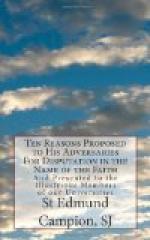the lot of Catholics in town unbearable, whereas in
the country the pursuit was far less active, and could
be much more easily avoided. The two Fathers met
for the last time at Hoxton, then a village outside
London, to concert their plans for the next couple
of months, and were on the point of starting, each
for his own destination, when a Catholic of some note
rode up from London. This was Thomas Pounde, of
Belmont or Beaumont, near Bedhampton, a landed gentleman
of means, an enthusiastic Catholic, and for the last
five years or so a prisoner for religion. Mr.
Pounde’s message in effect was this. “You
are going into the proximate danger of capture, and
if captured you must expect not justice, but every
refinement of misrepresentation. You will be
asked crooked questions, and your answers to them
will be published in some debased form. Be sure
that whatever then comes through to the outer world
will come out poisoned and perverted. Let me
therefore urge you to write now, and to leave in safe
custody, what you would wish to have published then,
in case infamous rumours should be put about during
your incarceration, rumours which you will then not
be able to answer or to repudiate.” Father
Persons seems to have agreed at once. Campion
at first raised objections, but soon, with his ever
obliging temper, sat down at the end of the table
and wrote off in half an hour an open letter
To
the Lords of Her Majesty’s Privy Council,
afterwards so well known as
Campion’s Challenge.
3. The challenge.
Campion, after finishing his letter and taking copy
for himself, had consigned the other copy to Pounde.
Persons had done the same; but whereas the latter
took the precaution to seal his letter, Campion had
handed over his unfastened. Then the company
broke up. Persons made a wide circle from Northampton
round to Gloucester, while Campion made a smaller
circle from Oxfordshire up to Northampton. When
they got back to town in September, they found all
the world discussing “the Challenge.”
What had happened was that proceedings had been taken
by the Ecclesiastical Commission against Pounde, and
he had been committed to solitary confinement in the
ruinous castle of Bishop’s Stortford. Before
he left London he began to communicate the letter to
others, lest it should be altogether lost, and as
soon as it was thus published it attracted everyone’s
attention, and his adversaries had ironically christened
it the challenge. The word was indeed
one which Campion had used, but he had employed it
precisely in order to avoid any charge that might
have arisen, of being combative and presumptuous.




